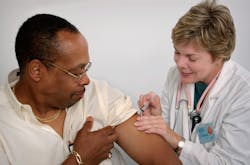Sleeping on the Job: Medical Residents Forced to Work Long Shifts
A new public opinion poll is reaffirming studies that show medical residents who work extensive shifts are putting both patients’ safety and their own safety at risk.
The poll, commissioned by Public Citizen, a national nonprofit organization, questioned 500 likely voters of various demographics and political parties about whether long work shifts for medical residents would increase risk and whether medical residents should be limited to the number of hours they can consecutively work.
The phone survey was conducted in response to physician organizations who are lobbying for the Accreditation Council for Graduate Medical Education to lift the 16-hour cap for interns in the medical, which would allow them to practice for 28 or more hours in a row without sleep.
“The takeaway is that now is not the time for the ACGME to backtrack and let resident physicians work longer shifts,” said Celinda Lake, president, Lake Research Partners, the firm that conducted the poll.
Key findings show consistency across party lines and demographics with 84 percent of democrats, 83 percent of independents and 88 percent of republicans in opposition to a lift on the current 16-hour shift ban for first-year residents. In addition, 80 percent of respondents also supported decreasing the shift limit from 28 hours to a maximum of 16 hours for residents in their second year and above, according to Public Citizen.
“Medical residents are not superhuman, and when they’re not getting sleep, they’re putting patients in harm’s way,” said Dr. Michael Carome, director, Public Citizen’s Health Research Group.
Physician and Patient Risk
The effects of sleep deprivation could be devastating to both patients and the medical student. Performance is likely to be “severely impaired” if the students works longer than 24-hour shift, said Dr. Charles Czeisler, Ph.D., chief, Division of Sleep and Circadian Disorders, Departments of Medicine and Neurology, Brigham and Women’s Hospital, and Baldino Professor of Sleep Medicine, Harvard Medical School.
“Performance equivalent to being drunk when working shifts longer than 24 hours or extended duration shifts,” he said. “The risk of a serious medical error is up by more than 300 percent when working extended duration shifts.”
Physicians who work longer shifts show an increased risk of cardiovascular disease, blood pressure and cancer. Immune response also is greatly reduced. In terms of performance, doctors who work shifts longer than 20 hours have a 73 percent higher risk of piercing themselves with medical instruments and a 178 percent increased risk of getting into a motor vehicle crash when driving home.
In addition, suicide is an occupational hazard of the medical professional, with physicals showing a two-to-three time higher risk than their patients, said Dr. Pamela Wible, founder, Ideal Medical Care Movement and author of Physician Suicide Letters—Answered.
According to Dr. Wible, bullying, hazing and sleeping deprivation are widespread in medical residency programs. When residents do speak up, they’re labeled as unprofessional and experience escalating instances of bullying. In addition, she has spoken with students who leave their programs due to violations of the work limits and are forced to sign non-disclosure agreements.
“Urgent action is required to address sleep deprivation and unsafe working conditions,” she said. “This is the culture of medicine that residents are being indoctrinated to accept as normal.”
With the primary goal of residency training being to learn and retain ideas, allowing students to work longer than 16-hour shifts is detrimental to the process, said Dr. Kelly Thibert, national president of the American Medical Student Association.
“Residency training should produce competent physicians,” she said.
However, residents continue to underreport hours for many reasons including fear of retaliation or fear of harming reputation of programs.
Sleeping on the Job
Two current studies, FIRST and iCOMPARE — are investigating the effects of sleep deprivation on medial interns. However, the issue with these studies is that they are being done unethically without voluntary consent of the patient or the medical resident, according to Public Citizen.
“There are tens of thousands of patients who did not know they were being treated by residents who were working 28 hours without sleep,” said Dr. Sammy Almashat, M.P.H., researcher, Public Citizen’s Health Research Group.
Student physicians are randomly assigned to either a control hospital that follows ACGME’s current duty-hour rules or to another, experimental area where shift length limits were longer than 16 consecutive hours.
Dr. David Y. Harari, M.S.B., second-year psychiatry resident and clinical instructor at the University of Vermont Medical Center, spoke during a conference call about his first-year residency experience in which he was part of the study at another college.
After working consecutive 30-hour shifts, Dr. Harari experienced “severe headaches, nausea and vomiting.” Neither him, fellow students or patients were informed that they would be part of the study, he said.
Doctors like all human beings cannot suspend the physiological factors that go with lack of sleep,” he said. “I heard too many stories from fellow residents about close calls and near misses with drives home.”
